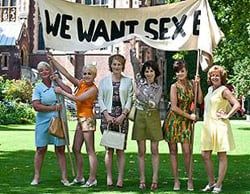AFI Fest Review: Made In Dagenham

Inequality is such a ridiculous concept, yet remains prevalent in our society to this day. One can’t make an argument based on reason or fact why anyone different from themselves, be it color, creed or gender, should be treated differently or given different standards, positive or negative. But while the developed world has made some tremendous strides in the way of equality in recent years, it was less than fifty years ago that women were being treated as second class citizens. Set in that world, Nigel Cole’s Made in Dagenham tells the story of the women who helped change everything.
Set in 1968 at the Ford Dagenham car plant in England, 187 female employees have grown tired of being compensated less than their male counterparts for equal work. Led by a woman named Rita O'Grady (Sally Hawkins), the women machinists decide to strike and refuse to resume working until they are properly compensated. A dramatization of real events, the events that transpired facilitated the equal pay movement immensely and helped put some of the first laws regarding the subject on the books.
Though the film occasionally falls into some shallow traps, it does a wonderful job recreating the atmosphere of the decade and mixes moods quite well, treating the serious subject matter with proper gravitas and allowing the funnier moments to be just that.
In regards to the performances, the two standouts are Hawkins (unsurprisingly given the role) and Bob Hoskins, as a manager at the Ford plant who commiserates and assists the women in their effort. Hawkins, who won a Golden Globe for her performance in the film Happy-Go-Lucky, plays the fictional O’Grady perfectly, never really bursting with confidence, instead acting like a real human being would act if thrown into the situation. Hoskins’ Albert Passingham is simply a terrific supporting character, providing the film with a great deal of humor without stealing the spotlight away from his female co-stars. His presence also helps balance the film, as he is only one of two prominent male characters that doesn’t come across as either a chauvinistic ass or two-faced scum.
As suggested above, one of the film’s greatest assets is its humor. While not nearly as surprising as the laughs found in Rabbit Hole, the film could have easily been a militant look at the events that transpired in the late 60s, but is more engaging and entertaining as more lighthearted fare. That’s not to say that the film doesn’t have its fair share of drama, but it’s a nice mix.
If the film has one glaring hole, it’s the relationship between Rita and her husband (Daniel Mays). As you can probably guess, Rita’s involvement with the strike takes a toll on their relationship, but it is because of that predictability that it sours the film. Though the relationship is meant to make Rita into a more well-rounded character, it doesn’t really work because the husband is so two-dimensional. A fellow worker at the Ford plant, it’s his job to be supportive until Rita’s work begins to affect him, at which point he simply becomes overly passive aggressive. It’s not a crippling aspect, but certainly one that didn’t need to be explored as heavily as it was.
Though a great deal of progress has been made, a glass ceiling still exists for most women (and let’s not even discuss how women are treated in the world’s less developed countries). Perhaps all we need for full gender equality, however, is another push like the one made by the women of Dagenham. Though not without its faults, Nigel Cole’s Made in Dagenham sports some terrific performances, has a great period-piece feel and a real story to tell.
CINEMABLEND NEWSLETTER
Your Daily Blend of Entertainment News
Follow along with all of our special AFI Fest coverage right here.

Eric Eisenberg is the Assistant Managing Editor at CinemaBlend. After graduating Boston University and earning a bachelor’s degree in journalism, he took a part-time job as a staff writer for CinemaBlend, and after six months was offered the opportunity to move to Los Angeles and take on a newly created West Coast Editor position. Over a decade later, he's continuing to advance his interests and expertise. In addition to conducting filmmaker interviews and contributing to the news and feature content of the site, Eric also oversees the Movie Reviews section, writes the the weekend box office report (published Sundays), and is the site's resident Stephen King expert. He has two King-related columns.
Most Popular







